OVERRIDDEN
Student Government overturns veto. Read on page 2



LSUReveille.com
@lsureveille

Student Government overturns veto. Read on page 2



LSUReveille.com
@lsureveille
LSU’s Student Senate voted Wednesday to override the Student Government president’s veto of a resolution condemning Attorney General Jeff Landry for missing a gubernatorial forum held on campus.
Landry was the only major candidate for governor not in attendance at the forum held at the Student Union on Sept. 13. Instead, he was at an event in Bossier City with Donald Trump Jr.
The resolution called Landry’s absence “a detriment to the electorate” and slammed his “conscious decision to participate in a hyper-partisan rally instead of an organized debate with his actual opponents.”
Though the Senate passed the resolution overwhelmingly one week earlier — with 43 votes in favor, three against and six abstentions — senators seemed less eager to push the condemnation past the veto. 23 voted in favor of overriding, seven voted against and 20 abstained.
The Senate needed a twothirds majority to override Strong. Those abstaining didn’t factor into that fraction.
Strong’s veto, issued Friday, drew quick opposition. The resolution authors — graduate student Sens. Alicia Cerquone and Cullen Hodges — told the Reveille they “fundamentally disagree with President Strong on the role of the Student Government.” LSU College Democrats revoked their endorsement of Strong from the spring election.
When the Senate opened the floor for public input at the beginning of its Wednesday meeting, Debate LSU, the main organizer of the gubernatorial forum, weighed in on the controversy. Strong is the communications director of the organization, according to an August Instagram post.
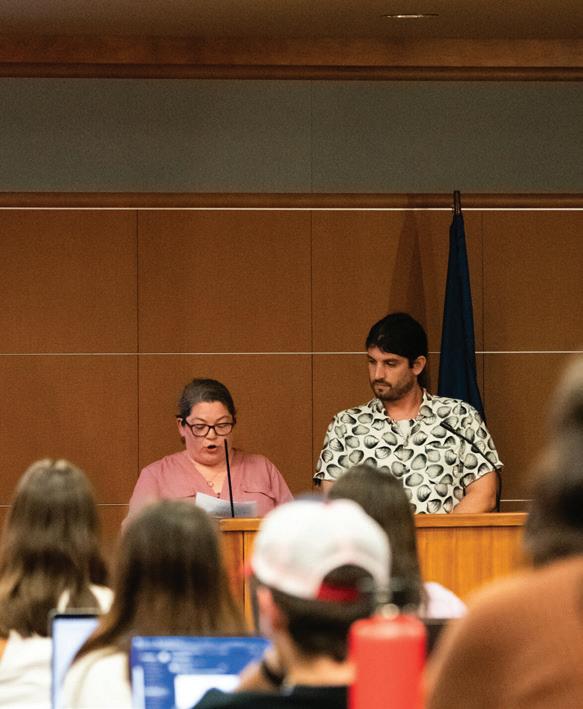

Jake Netterville, who serves as secretary, read a letter from the organization’s president, Harper Doer.
In his letter, Doer expressed gratitude for SG’s partnership in putting on the forum but voiced fears that the resolution could dissuade candidates from participating in a similar event in the future.
“SGR 3 threatens the possibility of an event like this happening again in the future as it has completely overshadowed the event and its successes,” Doer wrote. “If a candidate cannot decline an invitation due to a scheduling conflict without proposals being written to publicly condemn them, will this not compromise the legitimacy of the Forum?”
He also felt it was wrong to label Landry’s absence from the forum as a “refusal.” Doer explained that “Landry declined his
invitation to our Forum due to a previously scheduled event … that conflicted with the Forum.”


In her veto letter sent to the speaker of the Senate, Strong said, “I must veto SGR 3 due to its nature as political commentary.”
She maintained that position in her opening remarks before the Senate, saying it wasn’t appropriate for SG to take a position.
Strong emphasized alternative ways for LSU students to exercise their voice by voting and encouraging civic education.
Strong opted not to take questions at the end of her statement.
“Do I have to?” she said before walking away from the podium.
In defense of their resolution, Cerquone and Hodges cited a long list of times the Senate has taken political stances in representation of the student body.
“This legislation is inherently political. . .and that’s the point,” Cerquone said.
Cerquone emphasized the influence that governors hold over LSU, citing the buildings Gov. Huey Long got built and the higher education budget Gov. Bobby Jindal slashed. She also pointed out that the governor appoints the Board of Supervisors, the body tasked with managing the university.
And in Hodges’ eyes, Landry did not simply miss the governor’s forum at LSU because he was elsewhere; he chose to be elsewhere.
“We know what Jeff Landry was doing on the night of the debate. It’s in the bill,” Hodges said. “We know what choice he made. Was it possible for him to choose differently? We submit, yes. Did he? No. What he chose to do deserves our consideration and our judgment, as does the behavior of every single governor’s candidate. This is not a matter of policy. This is a matter of principle.”
When the floor opened for general debate, four senators took the podium in sequence. All four expressed opposition to the veto.
“A governor candidate with the power to make decisions that directly affect the future of every student on this campus is something that is inherently in the interest of every student on this campus,” said Sen. Ethan Elmer, who represents the University Center for Freshman Year. “This is not the opposition of the candidate, this is the opposition of the calculated disenfranchising of LSU students through the natural and expected avenue of public forum that this candidate did not participate in.”
In their closing remarks, Cerquone and Hodges urged the Senate to override Strong’s veto.
“We as a body do have the ability to make that decision, and we as a body should make that decision as for all of our constituents that we represent,” Hodges
said.
To not vote for the veto would be to “sell yourself short on what you’re capable of doing as a Student Government senator,” Hodges said.
He referenced the alternative ways, mentioned earlier by Strong, that SG can motivate the student body to be politically active, “but what say we walk and chew bubblegum?” Hodges asked. “Is that a possibility?”
In her closing statement, Strong reiterated the other methods, besides the resolution, SG could use to enfranchise campus.
“Until we walk, and we all walk, I think we should wait to chew bubblegum,” she said.
Emma Bruney
Emma Long
Aimee Guillory
Alicia Cerquone An Tra
Alisha Ortolano
Ava Ryder
Avery Willams
Avery Watts
Brett Robertson
Brian Gage
Calvin Feldt
Caroline Rowell
Cartie Whitelaw
Chloe Berry
Colin Raby
Corbitt Driskell
Cullen Hodges
Dhriti Shastri
Ella Paddock
Emma Champagne
Emma Miller
Ethan Elmer
Gabby Fontenot
Gabby Farrar
Gabriel Freedman
Jay Reynolds
Jayden Bates
Jazlyn Gladney
Jocelyn Wood
John Savoy
John Appleton
Julius Pallotta
Kelsey Womack
Kendal Fraizer
Kennedy Bissant
Lailah Williams
Lavar Henderson
Lillian Bourgeois
Lilly Small
Lucrezia Tomassetti
Madilynn Mitchell
Madison Reynolds
Margaux Ward
Mavi Pace
Mohamad Habib
Nicole Monceaux
Presley Gilbert
Rachel Morgan
Rachel Sheppard
Rami Abdalla
Samya Chin
Simmion Demery
Stefen Brower
Tabari Bowser
Taylor Davin
Tyhlar Holliway
Zachary Darling
B-16 Hodges Hall
Louisiana State University
Baton Rouge, La. 70803
NEWSROOM (225) 578-4811
Editor in Chief CLAIRE SULLIVAN
Managing Editor LAUREN MADDEN
Digital Editor JOHN BUZBEE
News Editor CROSS HARRIS
Deputy News Editor OLIVER BUTCHER
Sports Editor PETER RAUTERKUS
Deputy Sports Editor MACKAY SUIRE
Entertainment Editor MOLLY TERRELL
Opinion Editor COLIN FALCON
Multimedia Editor MATTHEW PERSCHALL
Production Editor MADISON COOPER
Chief Designer EMMA DUHÉ
ADVERTISING (225) 578-6090
Layout/Ad Design BEAU MARTINEZ
Layout/Ad Design SAMUEL NGUYEN
The Reveille holds accuracy and objectivity at the highest priority and wants to reassure its readers the reporting and content of the paper meets these standards. This space is reserved to recognize and correct any mistakes that may have been printed in The Daily Reveille. If you would like something corrected or clarified, please contact the editor at (225) 578-4811 or email editor@lsu.edu.
The Reveille is written, edited and produced solely by students of Louisiana State University. The Reveille is an independent entity of the Office of Student Media within the Manship School of Mass Communication. A single issue of The Reveille is free from multiple sites on campus and about 25 sites off campus. To obtain additional copies, please visit the Office of Student Media in B-39 Hodges Hall or email studentmedia@ lsu.edu. The Reveille is published biweekly during the fall, spring and summer semesters, except during holidays and final exams. The Reveille is funded through LSU students’ payments of the Student Media fee.
College freshmen have long worn the trope of bad nutrition and poor cooking skills. LSU is trying to combat that.
The university hosts multiple events throughout the semester to help students gain a better understanding of healthy, balanced eating. Here’s a look at what these occasions can provide for students looking to expand their nutritional knowledge.
In partnership with foodservice management company Chartwells’ Higher Education, LSU will be putting on a series of food-centric events over the year called “Joyful.” The most recent event, a food fair, was on Sept. 26. The next event in the Joyful series, a cooking class, will take place on Nov. 14. The series aims to offer students “a taste of some international cuisine,” according to the LSU Dining Hall website.
The “Teaching Kitchen” is another LSU resource students can take advantage of to learn about nutrition. On Oct. 13, LSU invites students to the Teaching Kitchen to learn how to cook with LSU Dining’s “Feel Good Food of the month,” pumpkins.
“Students will get a walkthrough from one of our chefs
WEATHER
on how to create their own different flavored butter with pumpkin loaf,” reads the LSU Dining Hall website.
For students who don’t like pumpkins but would still like to get into the Halloween celebration, LSU Dining is putting on another event on Oct. 31 from 4:30 to 9:30 p.m. LSU Dining will be celebrating Halloween with a fall festival-themed menu in all of the dining halls.
LSU Dining’s Feel Good Food of the month in November will be chickpeas.
Another Teaching Kitchen event on Nov. 10th will teach students how to make chickpea cookie dough.
As part of the chickpea theme, The 459 Commons will also have a hummus bar on Nov. 16.
LSU’s dining halls also put on a breakfast for dinner event on Sept. 19.

“I don’t wake up in time to go to breakfast at the dining halls, but I hear it’s the best time to go, so you know I’m not missing this,” said kinesiology sophomore Jasmine Davis.
Davis wasn’t alone in that.
“The only time I have ever had breakfast at the dining hall is when they have offered it for dinner,” said Kyra Bennett, Davis’ friend and fellow kinesiol-
ogy sophomore. “Keep in mind, I’ve only been here for two years, so maybe there’s time for
me to make an actual breakfast, but from what I’ve had here, I would definitely wake up for it.”
LSU has many opportunities to help students achieve nutritional literacy.
A $1.1 million grant from the National Science Foundation is helping three professors from the department of environmental sciences adapt rural Baton Rouge to climate change.


Headed by professors Nina Lam, Linda Hooper-Bùim, Rebeca de Jesús Crespo and backed by students, the project aims to find new ways to predict climate-related challenges in the community and expand knowledge on resilience measures and ecological assessments.
“One of my research goals is to be able to tweak my sciencebased resilience research to help the community to improve resilience on the ground. We need to follow the science and its principles, but we also need to adapt the science to local communities.” Lam said.
To assist their research, the team will use the Final Ecosystem Goods and Services Scoping Tool, a device that provides input on any decisions the team considers, allowing for a comprehensive and holistic approach to problems facing the community. The tool will primarily be used to identify those most affected by climate change.
Technology alone can’t fix ev-
erything, which is why Jesús Crespo said the team has adopted a three-step approach: clarify problems with the community, make predictions, then use the ecosystem modeling to make change.
Community involvement will be crucial to the project’s success and has already played a part in assisting the team’s research.
“We want to establish trust while getting feedback from the community,” Jesús Crespo said.
The community won’t be the only ones helping in the project. LSU is starting the Gulf Renaissance Scholars Program, a new undergraduate research program funded in part by a $450,000 fund from the National Academy of Sci-
ences.
Led by Hooper-Bùi, the program will work with Lam’s team to meet communities’ immediate and long-term climate needs.
The project will take place over a span of 4 years, but the team hopes effects on communities will be lasting. Student participants are being trained to fo -
cus their career paths on working locally with assistance coming from connections made across the country, according to Crespo. The hope is that with enough of these connections, students from far and wide can begin tackling their communities’ climate issues and help the country as a whole better withstand climate change.

Chinese Students and Scholars Association is hosting a lantern-themed carnival event at the Parade Ground outside of the Student Union. It will run from 5 p.m. to 9 p.m.
Campus Crusade for Christ is hosting a bible study for freshmen in Greek life. It will be located at the LSU Student Union in the Council 312 room and begin at 4:15 p.m.
Every first Sunday in a month is free at the LSU Museum of Art. The event is located on the fifth floor of the Shaw Center for Arts, 100 Lafayette Street.
During the late 1960s and early 1970s, musicians took a political stand against the Vietnam War through their music.
Many anti-war anthems were produced, and often, these songs are thought of interchangeably with the Vietnam War. The era of “Vietnam Music” became a part of U.S. history.
When the U.S. government declared that the nation would be intervening in the war, American citizens (predominantly the youth) protested against what they saw as America’s unnecessary involvement. The phrase “hell no, we won’t go” was shouted in the streets, along with signs held high by those who opposed the war. The U.S. military forcibly drafted young men, and some succeeded in “draft dodging.”
In an effort to have the American government listen to the public’s plea, many musicians protested the war through music. As Buffalo Springfield said in “For What It’s Worth,” “There’s battle lines being drawn/ Nobody’s right if everybody’s wrong, Young people were speaking their minds/ Gettin’ so much resistance from behind.”
This time in American history produced some pivotal songs, with gripping lyrics that swayed public opinion. The iconic Vietnam protest song “Fortunate Son,” by Creedence Clearwater Revival, captures the population’s view of the war.

With the lyrics, “Some folks inherit star-spangled eyes/ Ooh, they send you down to war” and “I ain’t no senator’s son,” the band expresses how those in powerful positions didn’t worry about being sent off to fight in a war.
The band’s other song, “Run Through the Jungle,” illustrates the Vietnam battlefield vividly. The lyrics, “Two hundred million guns are loaded/ Satan cries, ‘Take aim’/ Better run through the jungle,” express how much fear the soldiers felt.
During the 1969 “summer of love,” the Woodstock Music and Art Fair aimed to bring unity, to bring forth peace and love. Of this free festival was Jimi Hendrix’s rendition of the national anthem played solely on his guitar. This gut-wrenching guitar solo sounds like a distorted speaker playing the Star-Spangled Banner. At various parts, Hendrix imitates the sounds of helicopters, gunfire and the dropping of bombs with his guitar. As he plays this, there are
no other sounds but his guitar, and the crowd is silent as they watch in awe.
A poignant song that has an anti-war message is “Eve of Destruction” by Barry McGuire. This song starts off strong with the lyrics, “Violence flarin’, bullets loadin’/ You’re old enough to kill, but not for votin’/ You don’t believe in war, but what’s that gun you’re totin’.” This song has the undeniable message of the political unrest citizens were feeling at this time.
Another song, “Billy Don’t Be A Hero” by Bo Donaldson & The Heywoods,” follows the narrative of a young man named Billy who wants to be drafted so he can be a hero. Billy’s girlfriend begs him to stay and not be a hero, but he goes anyway. Billy ends up being killed in battle, and his girlfriend receives the infamous letter many young women received that told them their beau had died. One part of the song follows the young woman’s words when she begs Billy not to get in the draft line, and the song follows, “Billy, don’t be a hero, don’t be a fool with your life… And as he started to go, she said, ‘Billy, keep your head low.’”
The song “Something In The Air” by Thunderclap Newman is another anti-war anthem. The
opening, “Call out the instigators/ Because there’s something in the air/ We got to get together sooner or later/ Because the revolutions here/ And you know it’s right,” was a cry to join arms together against the war.
The song “War” by Edwin Starr is undeniably the spearhead of the anti-war message. Starr sings, “It ain’t nothing but a heartbreaker/ Friend only to The Undertaker/ War is an enemy to all mankind/ The thought of war blows my mind/ War has caused unrest within the younger generation/ Induction, then destruction/ Who wants to die?”
John Lennon’s “Gimme Some Truth” may not be about the Vietnam War specifically, but it’s still a political protest-heavy tune. The lyrics “I’m sick and tired of hearing things/ From uptight, short-sight-
ed, narrow-minded hypocrites/ All I want is the truth/ Just give me the truth” are a powerful message felt by all who came to distrust the politicians who supported the war.
Whether this song relates to the Vietnam War is debatable, but “Magic Carpet Ride” by Steppenwolf opens with the sounds of a roaring helicopter. The speculation is that the song is a wish for a magic carpet ride with a girl to take the soldier away. The sound of the guitar imitating a helicopter makes listeners think this is the meaning of the song.
There’s much more to this period of music, and so many songs with underlying messages of protest against war and violence. Music and musicians began using their songs as a way to generate change, something that wasn’t as common before the war.

The LSU men’s and women’s basketball teams had their first practices in the Pete Maravich Assembly Center. The women’s team held an open practice on Sept. 25, while the men’s Sept. 26 practice was not open to the public.
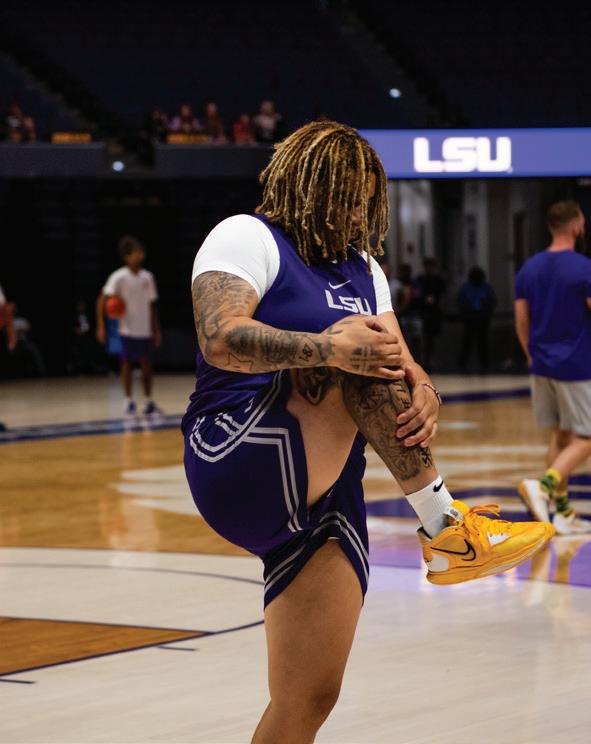
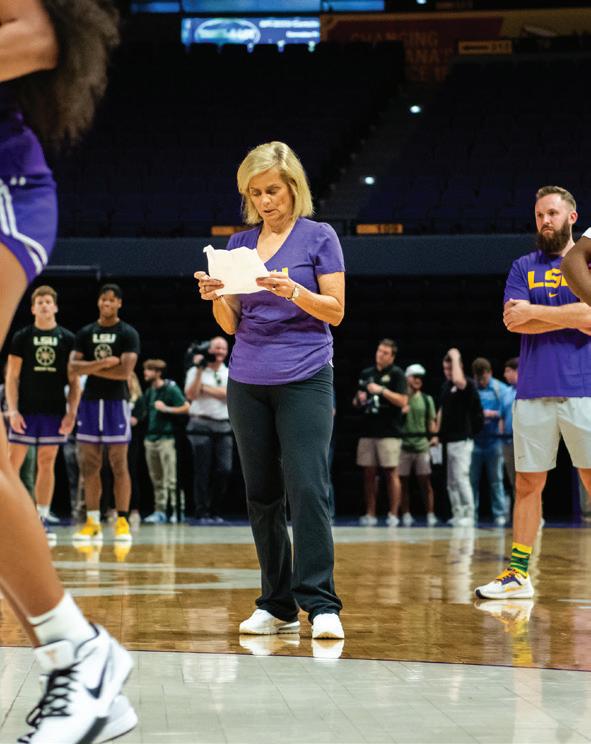
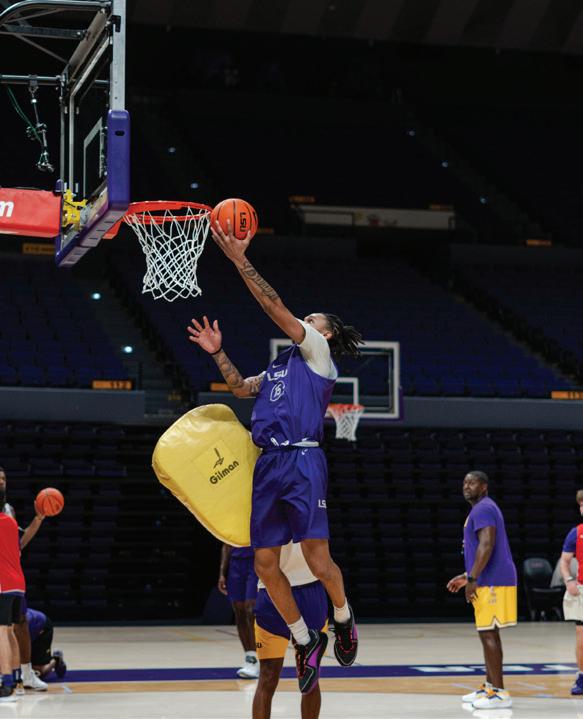


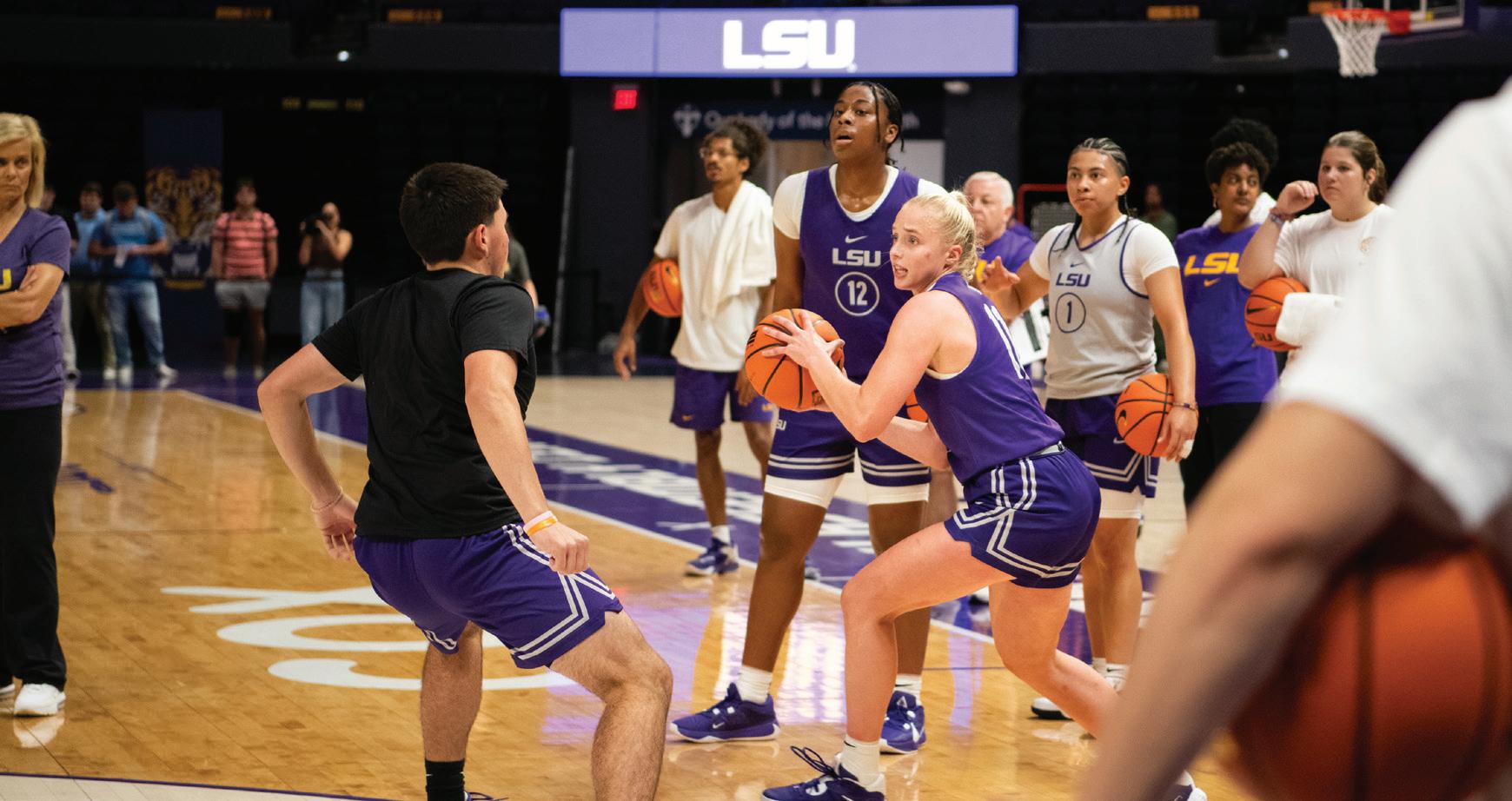

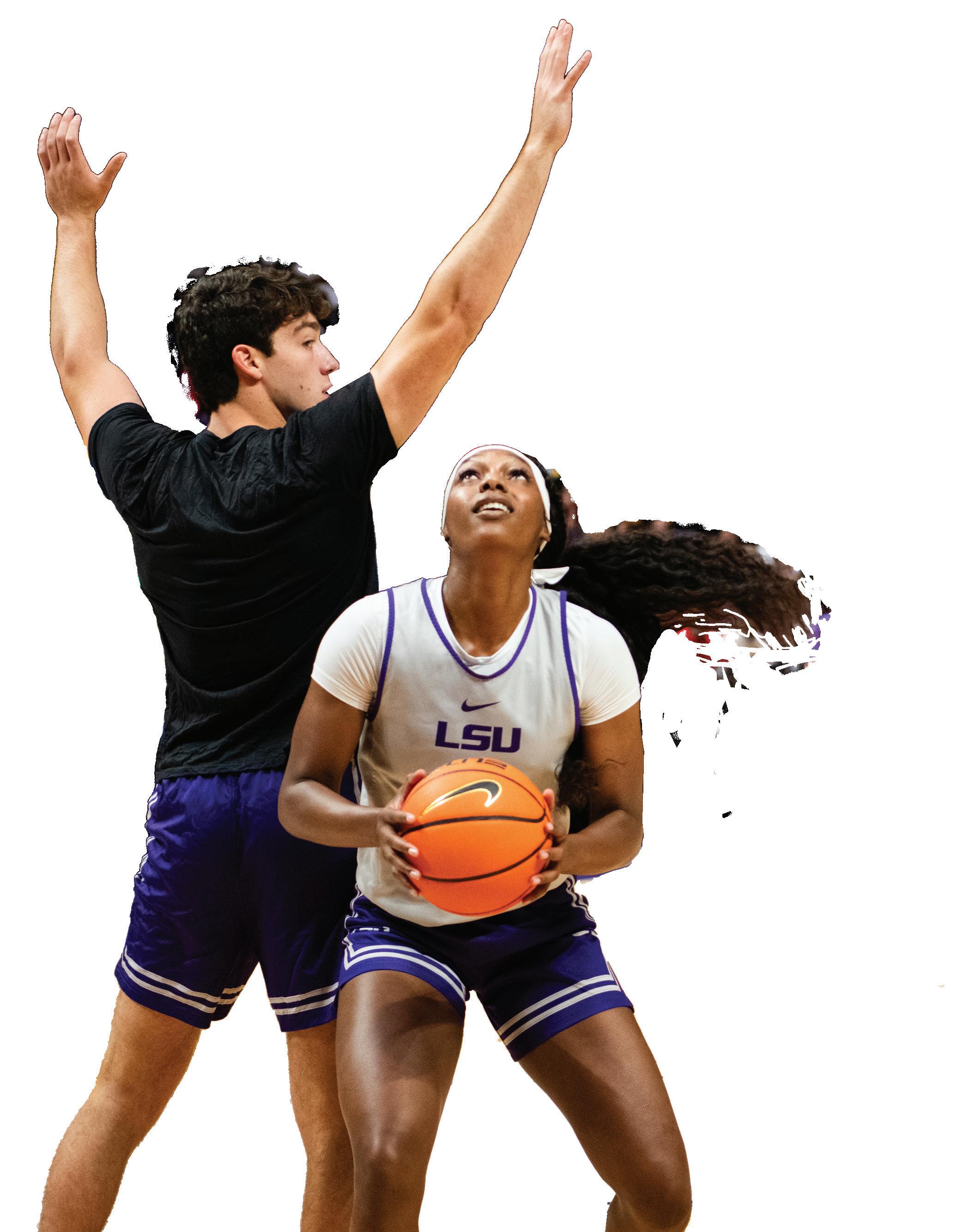

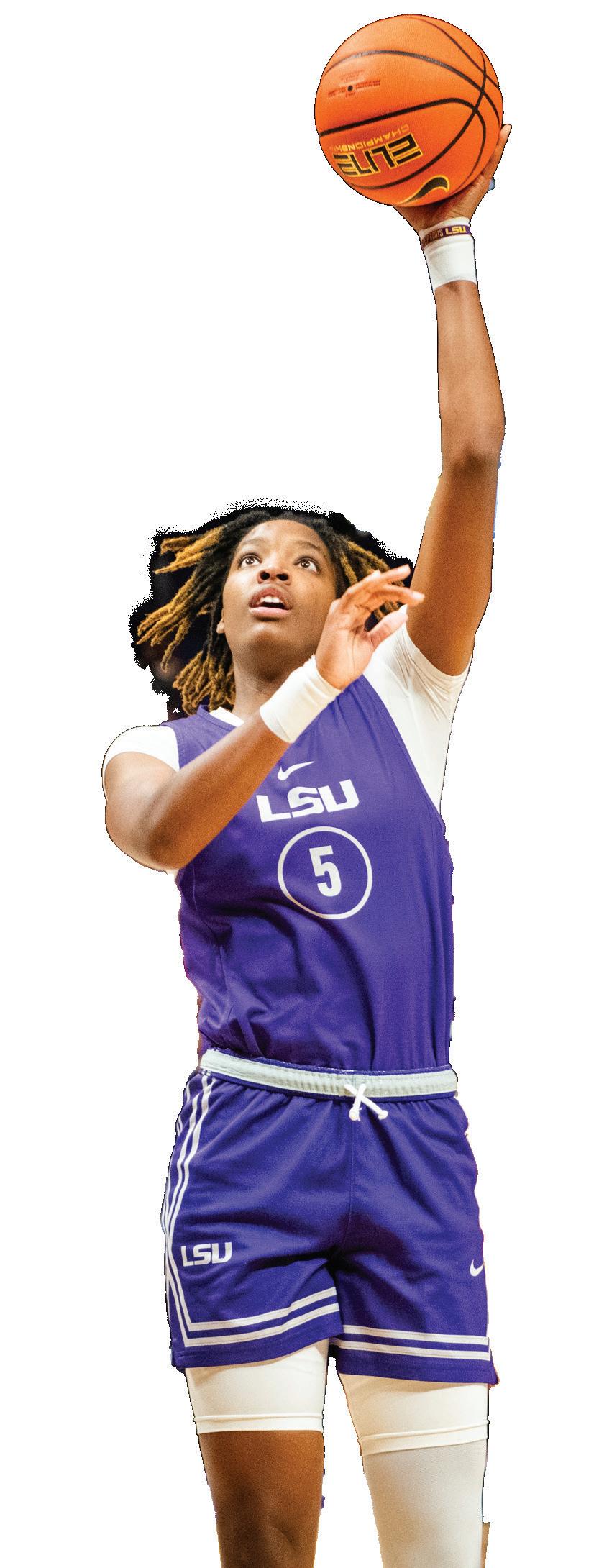
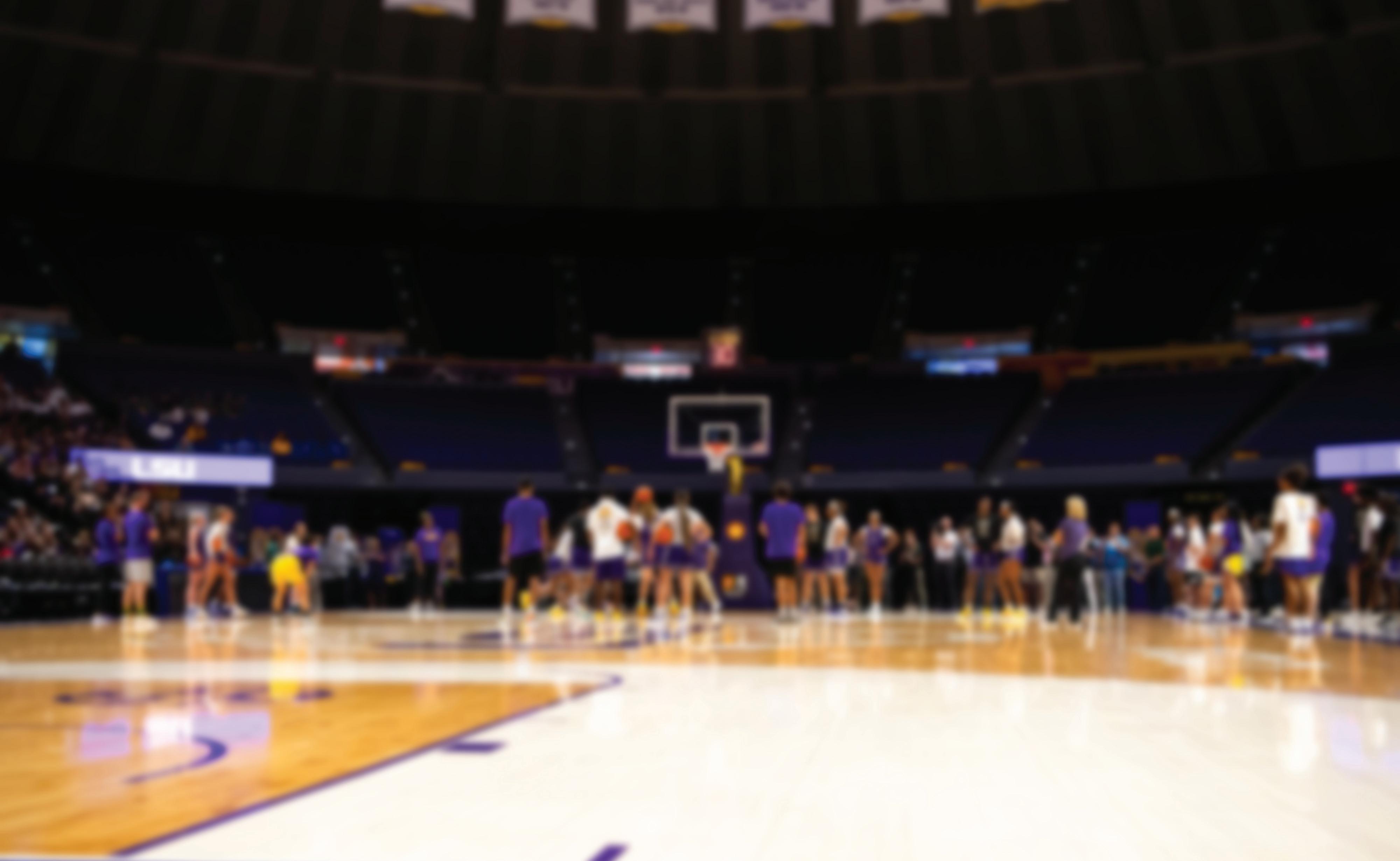

It’s good practice not to put too much stock into a good performance until you see it repeated.
LSU’s defense had some serious questions heading into the season, primarily in the secondary, and those concerns seemed to be validated by shaky performances against Florida State and for the first few drives against Grambling State.


Then, in the Tigers’ first Southeastern Conferance matchup at Mississippi State, they held the Bulldogs to just 201 yards of offense and 10 first downs. From the very beginning, Mississippi State’s offense was stifled, with four of its first five drives going for threeand-outs.
There was hope the defense had turned the corner, but it still needed to prove its legitimacy against Arkansas.
It did just that in the first half, forcing the Razorbacks to settle for two red zone field goals and keeping the game close for a struggling offense. However, Arkansas drove inside the 10-yard line on each of its 3- second half drives, not counting the final hail mary heave, and scored a total of 18 points on those possessions, exposing the LSU defense.
Inside the team, coaches and players are confident that the defense will find its footing and that its true quality is more like what we’ve seen against Mississippi State and in the first half of the
FOOTBALL
matchup with Arkansas.
There have certainly been positives this season for the defense, but it’s hard to tell at this point how good the unit really is.
Here are two reasons to buy into the Tiger defense and two reasons to be skeptical:
The run defense has been consistently solid since the early stages of the Grambling game
On Grambling’s first three drives, it racked up 111 rushing yards on 11 attempts. The defense
tightened up after that, but the showing was concerning.
Since that point, across about two and a half whole games, the LSU defense has allowed 283 yards on 76 attempts, an average of 3.7 yards.
The team has been more disciplined across the board in defending the run, but also more explosive. The emergence of athletic freshman linebacker Whit Weeks has been big for the Tigers, especially with the ongoing absence of
linebacker Omar Speights. Andre Sam flashed in the Arkansas game as another second-level defender whose instincts will help to stop opposing rushers.
That was especially important in the red zone. LSU’s run defense contributed greatly to several goal-line stands, as it stuffed Arkansas for short gains while forcing the Razorbacks to settle for field goals on three different drives that each went inside LSU’s 10-yard line.
No team has really forced the issue against the LSU run defense
LSU hasn’t come against a team that both has placed a heavy emphasis on hammering the run against LSU and possesses an elite rushing game.
Despite Mississippi State entering the game as a run-heavy team, the Bulldogs came out passing. The game plan was clearly to challenge the Tiger secondary with quarterback Will Rogers’ arm.
When that didn’t work, and Mississippi State quickly found itself trailing, it was forced to continue passing to keep up and never really established the run. The Bulldogs finished with 21 rushing attempts, including just eight from star back Jo’Quavious Marks.
Arkansas did run the ball with more regularity than Mississippi State, but taking out KJ Jefferson’s scrambles, the Razorback offense ran only 29 designed runs against LSU, a season low.
FOOTBALL
The No. 20 Ole Miss Rebels will host the No. 13 Tigers at Vaught-Hemingway Stadium on Saturday in a highly-anticipated SEC West showdown.
Ole Miss enters this matchup coming off a tough loss to Alabama in Tuscaloosa, where it showcased a strong defensive performance in the first half but struggled to maintain its intensity throughout the game.
LSU narrowly secured a victory over Arkansas, a team it was expected to defeat by a more comfortable margin.
Both teams are 3-1, and Ole Miss seeks its first SEC win. Here’s a look at key Rebel players who could pose a challenge to LSU:
The second-year starter is a dual-threat quarterback similar to Jayden Daniels. Dart has three rushing touchdowns and leads the Rebels in rushing yards at 275. He also has 1,096 passing yards and seven passing touchdowns.
The Ole Miss offensive line has struggled early this season, and Dart adjusted by using his legs when his linemen failed to
The Ole Miss Rebels present a similar offensive attack to Arkansas, despite a few areas they thrive at more than the Razorbacks.
Coming into the season, it was expected that the Rebels would have a quarterback controversy. However, Jaxson Dart seems to have taken control of that position. In their four games this season, he’s completed 65 of 103 attempted passes for 1,096 yards and seven touchdowns.
But where Dart has separated himself was in the run game. On 44 carries, he has run for 219 yards and three touchdowns. Dart leads the team in rushing, which may come as a surprise to many.
Ole Miss running back, Quinshon Judkins, came into the 2023 season as one of the best running backs in the country after dominating last year as a true fresh-
man. Judkins has still been a force in the run game, but teams have controlled him. In 57 carries, he’s run for 201 yards and four touchdowns.
In the passing game, three receivers have dominated the targets, and they run a system where any one of those three can get the bulk.
Jordan Watkins leads the Rebels with 24 catches for 347 yards and a touchdown. Dayton Wade is right behind with 16 catches for 303 yards. But Ole Miss’ biggest threat in the red zone is Tre Harris, who has a team-high five touchdowns on eight catches for 188 yards.
Harris, however, has not played in the last two games for the Rebels against Georgia Tech and Alabama. On Monday, Ole Miss head coach Lane Kiffin said Harris was 70% against Alabama despite being held off the field. With that being said, the chance
see REBELS, page 10
It was clear that the team found more success through the air and needed to prioritize that, especially when the second half became a back-and-forth affair.
Arkansas also came into the game as an inefficient run offense, a trend that continued against the Tigers with an average gain of 3.7 yards.
LSU certainly has the players in place to be an elite run defense, with Mekhi Wingo and Maason Smith plugging up the middle and active linebackers and safeties always rushing in to help.
However, the team has yet to be truly tested by a perfect storm of strong rushing personnel and a determination to establish the run.
KJ Jefferson posed problems
hold blocks on passing plays. Keeping Dart contained in the pocket will be necessary for LSU, so he doesn’t break away with his speed.
Quinshon Judkins
After his explosive performance at running back in 2022, Judkins received SEC Freshman of the Year, CBS National Freshman of the Year and SEC Newcomer of the Year honors. He made the 2023 All-SEC Preseason First Team and has four touchdowns and 201 yards coming into Saturday’s game.
Statistically, Judkins’ numbers don’t compare to last season at this time, but he has been limited due to injury. However, he is still a threat to the Tigers defense on the run as well as the pass. He has eight receptions this season and is fourth on the team in receiving.
Jordan Watkins
This wide receiver leads Ole Miss in receptions with 24, is the leading returning receiver and has the most receiving yards for the Rebels at 347. He is Dart’s most reliable target and one to keep covered on every down.
Tre Harris
While Harris was out after a knee injury against Tulane, he still put up 188 yards in slightly more than one game. He returned for a few plays against Alabama and will be back on Saturday.
The Rebels mostly use Harris at the goal line, and he will be a red-zone threat. Out of his eight receptions, five were touchdowns, and his longest was only
REBELS, from page 9
for Harris to be a go against LSU on Saturday is likely, but he may still be limited.
On Tuesday, it also came out that Ole Miss tight end, Michael Trigg, is no longer with the program, Michael Katz first reported. Trigg led Rebel tight ends with four catches for 65 yards and a touchdown through two games. He also didn’t play against Georgia Tech and Alabama. Kyirin Heath will likely fill in more at
defensively that not many quarterbacks do
As great of a runner as Jefferson is on designed plays, LSU struggled most with getting him down when he dropped back to pass. His unique combination of strength and speed means he can break tackles and extend plays like few others can.
That led to a few back-breaking plays, like a crucial 25-yard scramble on third down in the first quarter that led to a field goal and a 59-yard passing touchdown early in the fourth quarter as Jefferson sprinted to his right.
The good news is LSU doesn’t have to face Jefferson again. Head coach Brian Kelly noted after an outstanding performance from his pass-rush against Mississippi State that it’s much easier for his defense to get a pocket passer down.
38 yards.
Defensive Players:
Trey Washington Washington was named the SEC Defensive Player of the Week for his performance against Georgia Tech. This safety is playing a larger role for the Ole Miss defense this season.
Last year, Washington had 31 tackles and wasn’t in a starting role. He now leads the team in tackles with 25. Washington is 12th in the SEC in tackles and will be key in stopping big passing and running plays.
Suntarine Perkins
The Rebels have a linebacker named Perkins of their own, and he is a threat to the Tigers on the pass rush.
With three sacks, Perkins is second in the SEC in sack yards at 26 and has 18 tackles, fourth in that category for Ole Miss. As a true freshman, Perkins has made an immediate impact for the team.
Ashanti Cistrunk
The linebacker has 23 tackles, following Washington. He is Ole Miss’ leading returning tackler and will be looking to stop the run and break through to keep Daniels closed off. Cistrunk is familiar with Daniels’ abilities, and the Tigers offensive line will need to push him back.
Khari Coleman
On defense, the Rebels tend to rotate their linebackers often throughout the game, which will keep the LSU defense on its toes. Alongside Perkins, Coleman is the main pass-rushing linebacker and leading sacker from last season. He is third on the team in tackles with 19.
tight end.
The Rebels suffered their first loss on Saturday to Alabama 2410; a game where the Crimson Tide took control in the second half. While LSU may be catching Ole Miss while it’s down, the Rebels have the home-field advantage to back them up.

However, it’s been known that Kiffin and the Rebels have a hard time coming back after a loss to Alabama. Last season, after the Rebels lost 30-24 to Alabama, they went on to lose their next
“If you’re a pocket quarterback, we’re going to get to you,” Kelly said. “If you take any time, we’re going to get to you.”
The Tigers do face a quarterback with dual-threat capabilities in Jaxson Dart this week, but he’s not quite the force that Jefferson is. Beyond that, LSU will face few mobile quarterbacks this season. That bodes well for the defense. Reinforcements aren’t coming for the secondary LSU’s greatest weakness is still its defensive backs, most specifically its cornerbacks. Sam and Major Burns have been solid at the safety spots, although they’ve had their struggles. The cornerbacks, however, have been consistently attacked by opposing offenses. Jefferson and the Arkansas offense didn’t stretch the field, but their quick passing game routine -
ly found LSU’s cornerbacks out of position on the fast-developing routes, as we’ve seen from the group even dating back to training camp. Tackling after the catch has also been an issue.
These issues aren’t going to be solved by personnel changes. Especially with injuries, the depth at cornerback this season is such that Denver Harris and Zy Alexander are LSU’s best options.
Kelly said in his Monday press conference that LSU has pretty much exhausted the personnel packages the team will be using on defense this season, meaning what we’ve seen is what LSU has. There is no blue-chip freshman ready to shoot up the depth chart midseason like there’s been in the past.
That means LSU’s hopes at cornerback hinge on internal im-
provement, which is hard to count on. The coaches have to teach the defensive backs and fix what has been hindering them.
Kelly spoke at length about the defensive backs trying to take on coverage responsibilities that aren’t theirs instead of making the simple play and holding down their own responsibility.
He gave the example of the aforementioned 59-yard passing touchdown in which Alexander lost his man deep because he floated down to account for Jefferson’s scramble despite Weeks already having pursuit.
“They’re trying to make up for some inexperience and trying to do a little bit too much,” Kelly said. “They just got to do their jobs, and when that group really comes together, with our front seven, I think we’re going to be a
two regular season games and their bowl game against Texas Tech.
This time around, Ole Miss will have to recover quick. Last season, the Rebels ended their regular season with unranked Arkansas and Mississippi State. While the Mississippi State game carries weight with it being the in-state rivalry labeled “The Egg Bowl,” Ole Miss will now have No. 13 LSU right after their loss to the Crimson Tide.
Two years ago, the Rebels
were 3-0 before losing to Alabama 42-21. They came back and only lost one game to Auburn the rest of the regular season, giving them a sport in the All-State Sugar Bowl with Baylor. They lost that game 21-7.
“Got a lot of football in front of us and a huge one this week, and I would argue may be the hottest offense in the country,” Kiffin said in a press conference on Monday.
Ranked at No. 20 currently, Ole Miss is a good enough team
to have a lot of success on the offensive side of the ball. But so much of that success will be dependent on their internal mindset.
LSU depending on Ole Miss to self-destruct isn’t the mindset it wants to go into the game with. If anything, two great performances by Jayden Daniels, Malik Nabers and Brian Thomas will give them enough momentum to knock off another threat for the SEC West title. As of right now, it’s anybody’s to grab.
One week ago, Reveille columnist Garrett McEntee wrote a story about his desire for an on-campus Waffle House. In that story, he lamented LSU’s sparse options for breakfast food, counting only five establishments that offer it.
His list only accounted for eateries on campus, so Louie’s Cafe, located just outside of LSU’s borders at 3322 Lake St., didn’t make the cut. This exclusion invoked the ire of many LSU alumni and Louie’s veterans, with many claiming the cafe’s existence alone invalidated the need for a Waffle House.
The Reveille opinion section is dedicated to thorough and exhaustive diner-related journalism. As such, we could not sit by while an alleged rival to Waffle House’s brand of greasy and delicious breakfast food went untasted.
Here is a chronicle of our thoughts on the Louie’s experience.
As the journalist behind the Waffle House article, I was skeptical that I would approve of Louie’s. However, I was pleasantly surprised.
To start off, I didn’t like the food; I got a waffle with two strips of bacon. The waffle was undistinguished—tough, flat and slightly cardboard-esque—which I strangley enjoyed. The maple syrup was pretty generic: sugary sweet. The bacon was extremely crispy, perhaps a little burnt, which I didn’t enjoy. 4/10 for food.
Our waitress was phenomenal, keeping our busy table entertained with witty one-liners. Her constant repertoire with each of us didn’t hinder her efficiency though, and, in fact, made the customer service experience a 10/10. I adore the Louie’s staff.
The last thing of note was the ambience. Children were screaming, and the teal, white and red of the parlor was phenomenal in the way only something slightly ugly could be. Easy 8/10 for atmosphere.
Louie’s is beloved for good reason, although I wish its hours were more accessible. I’d give it a solid 6/10, with the main attraction being the darling staff and family-oriented diner aesthetic. Perfect for early Friday mornings with friends.
EDITORIAL BOARD
Claire Sullivan Editor in Chief Managing Editor Lauren Madden Cross HarrisNews
Editor Deputy News Editor Oliver Butcher Colin Falcon Opinion Editor Nathaniel Dela Peña | @NateDerDonerAs one of the few LSU seniors in the Reveille opinion section, I was incredibly surprised when I found out the rest of the crew didn’t know about Louie’s. I’m glad that’s changed; they were introduced to a restaurant that will change their lives.
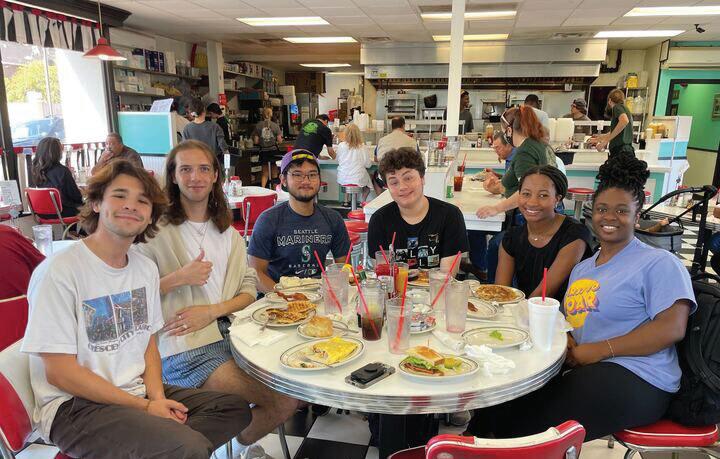
I ordered a Southern breakfast meal: chicken-fried steak topped with white gravy, eggs loaded with cheese, hash browns and biscuits with gravy. The chicken-fried steak had a perfect crust and tasted wonderful when paired with the creamy white gravy. I could tell the hash browns were freshly made, and they complimented the heaviness of the steak. Food-wise and service-wise, Louie’s never disappoints.
My only complaint with the cafe is that it takes forever for them to bring out the meal. But since I first went to Louie’s my freshman year, there’s a quote in my head that always comes up while I wait for my food: “Good things take time.”
Since Waffle House was never in my hometown, I never cared for that mediocre establishment. Louie’s has my heart, my wallet and, most importantly, my stomach.
Overall, I give Louie’s a 9/10.
Colin Falcon
| @nestingnests
I had high expectations for Louie’s. Its proponents are passionate, and it takes a special kind of establishment to garner such fervid support. Now, having tasted the fruits of Louie’s’ labor, I see why the cafe has garnered its reputation. On Friday morning, I bore witness to a true masterclass of college dining.
From my first step in the door, I was already succumbing to the Louie’s charm. The garish teal and red color palette was at once headache inducing and spiritually soothing. Parents were corralling unruly children. The wait staff looked randomly selected from a list of every make and model of person. One waiter was well over 6 feet 6 and had a chest-length beard. His presence improved my experience. The ambiance was easily a 9/10.
I’m of the opinion that the vibe makes the restaurant. Still, the food can’t be overlooked. My turkey, swiss, spinach and tomato omlette was nothing to write home about. A larger cheese fan than me may have had a better time though, as my omlette was bursting with it. The middling food, however, didn’t detract from my experience. It felt familiar and reliable, and I could see a Louie’s omlette being a meal to lean on in times of distress. 6/10 for the food.
MathewBy the time I finished my first ever meal at Louie’s Cafe, two things became clear.
First, it’s a quality little restaurant that I would certainly eat at again. As for the food itself, I ordered combo No. 3. The pancakes were good, if not a little thin, and the random piece of banana that fell into the batter was appreciated. They put more cheese on the scrambled eggs than I had expected, but that was actually a good thing. Finally, the bacon was oddly lukewarm but still enjoyable. I also had two cups of coffee. They could have been better but were by no means unpleasant to drink.
Second, the atmosphere and experience of Louie’s isn’t the same as that of a Waffle House, and it’s preposterous to argue that its existence is a substitute for one. Louie’s is a local, longstanding establishment. Waffle House is raw consumerist Americana. That kind of thing is often undervalued or even criticized, but it’s a sort of pure (if unhealthy) nostalgic environment that cannot be replaced. 6.5/10.
When I first walked into Louie’s Cafe, I was instantly put at ease by the family atmosphere. I also enjoyed the 1950s diner atmosphere. The restaurant’s decorations and theme make you feel like you’ve been taken back in time. We were greeted by a friendly server who helped us with our decisions for our meal. I decided to get banana and pecan pancakes. I had my reservations, because I would never think to combine those two ingredients. But to my surprise, I thoroughly enjoyed the pancakes. They were warm and tender; all things considered, I could tell they were made with love. Louie’s Cafe is the perfect breakfast spot for students on campus.
Before visiting Louie’s, I was a bit nervous. I’ve been a Waffle House girl my entire life, so eating at another diner felt like a crime. I played it safe and ordered a BLT. It seemed simple enough, and I didn’t want to be disappointed. I did, however, add a slice of avocado to spice things up. Once the food came out, the sandwich was pretty good, so I ate it. While the food was an absolute 10/10, my pride won’t allow me to say Louie’s is better than Waffle House. So, in conclusion, Waffle House is still the best diner.
Final thoughts:
While many of our allegiances still lie firmly in Waffle House’s territory, there’s something to be said about the value of a fresh experience. Louie’s Cafe was eye opening. It gave us a chance to think and reflect on our diner-related biases. An entire world of breakfast variety was waiting just beyond Waffle House’s yellow, run-down walls, and all we had to do was look in our own backyard.
Who knows how many more hidden gems are out there. The Reveille opinion section is open to trying them all.
The Reveille (USPS 145-800) is written, edited and produced solely by students of Louisiana State University. The Reveille is an independent entity of the Office of Student Media within the Manship School of Mass Communication. Signed opinions are those of the author and do not necessarily represent the views of the editor, The Reveille or the university. Letters submitted for publication should be sent via e-mail to editor@lsu.edu or delivered to B-39 Hodges Hall. They must be 400 words or less. Letters must provide a contact phone number for verification purposes, which will not be printed. The Reveille reserves the right to edit letters and guest columns for space consideration while preserving the original intent. The Reveille also reserves the right to reject any letter without notification of the author. Writers must include their full names and phone numbers. The Reveille’s editor in chief, hired every semester by the LSU Student Media Board, has final authority on all editorial decisions.
“Righteous, I like that. Kinda fitting when you think about it. If we danced and shared music, we’d be too busy en-joy-in’ life to start a war.”
